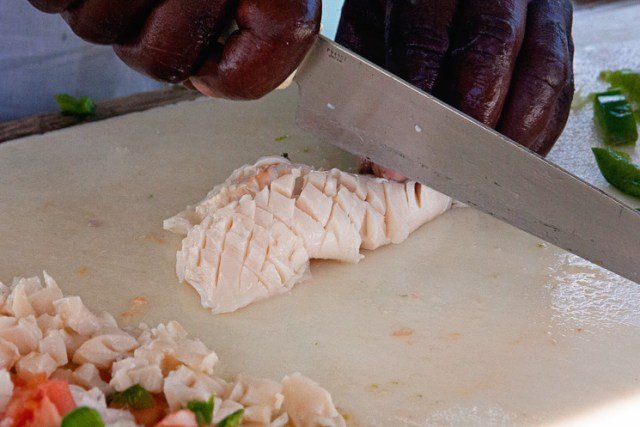Dock vendors bemoan significant drop in sales amid conch poisoning cases
NASSAU, BAHAMAS — The Bahamas Agricultural Health and Food Safety Authority’s (BAHFSA) Food Safety and Quality Unit has asked that all conch vendors discontinue the preparation and sale of raw/fresh conch dishes immediately.
The disclaimer comes amidst increased reports of conch poisoning in recent weeks.
At the end of last month, the authority cautioned consumers to avoid eating “fresh conch” or conch that is suspected to have been improperly handled or prepared until the source of contamination can be determined.
In a statement yesterday, the BAHFSA went further with its warnings, advising that an active multi-agency investigation is currently ongoing to determine the cause of the suspected conch poisoning.
“Note that the purchasing and/or consumption of raw conch will be at your own risk,” the authority said.
The investigation is in collaboration with the Public Hospitals Authority, Princess Margaret Hospital Microbiology Laboratory, the Food Safety and Technology Laboratory in the Department of Marine Resources and the Environmental Monitoring and Risk Assessment Division (EMRAD) Public Analyst Laboratory in the Department of Environmental Health Services.
“Until their findings are known, we ask that all conch vendors discontinue the preparation and sale of raw (fresh) conch dishes immediately,” the statement said.
“Upon the completion of the investigations, BAHFSA will make its recommendations with regard to the consumption of raw conch.”
Vendors on Potter’s Cay Dock told Eyewitness News that since reports of conch poisoning have increased, the sale of conch has gone down significantly.
One vendor noted that she doesn’t think they should have to stop selling conch, noting that while the water around the Potter’s Cay Dock area may be a concern, that doesn’t mean all conch is a risk, given that boaters often go to the outer islands to catch the conch and bring it back to the capital.
A conch poisoning outbreak in 2018, which was limited to New Providence, saw as many as 40 clinical cases.
At the time, the government said some of the cases originated from some vendors at Arawak Cay and the Montague Ramp, prompting the ministries of health and agriculture and marine resources to embark on an education campaign about the proper handling and cleaning of raw conch.
This time around, BAHFSA is strongly advising all consumers to only eat well-cooked conch, heated at 100°C for more than 10 minutes to ensure any potential pathogenic organisms are destroyed.
Additionally, it noted cooked conch should not be left at temperatures above 5°C/ 41°F for more than two hours.
Anyone who has consumed raw conch and fell ill is asked to seek treatment at the nearest clinic, hospital or doctor’s office and provide the place and date of purchase and any other pertinent information or personal samples requested by medical personnel.
Symptoms of conch poisoning include diarrhea, abdominal cramping, nausea, vomiting, fever and chills.
BAHFSA also requests that all medical facilities, including those on the family islands, report any suspected cases of gastroenteritis or conch poisoning to the Surveillance Unit of the Ministry of Health.






